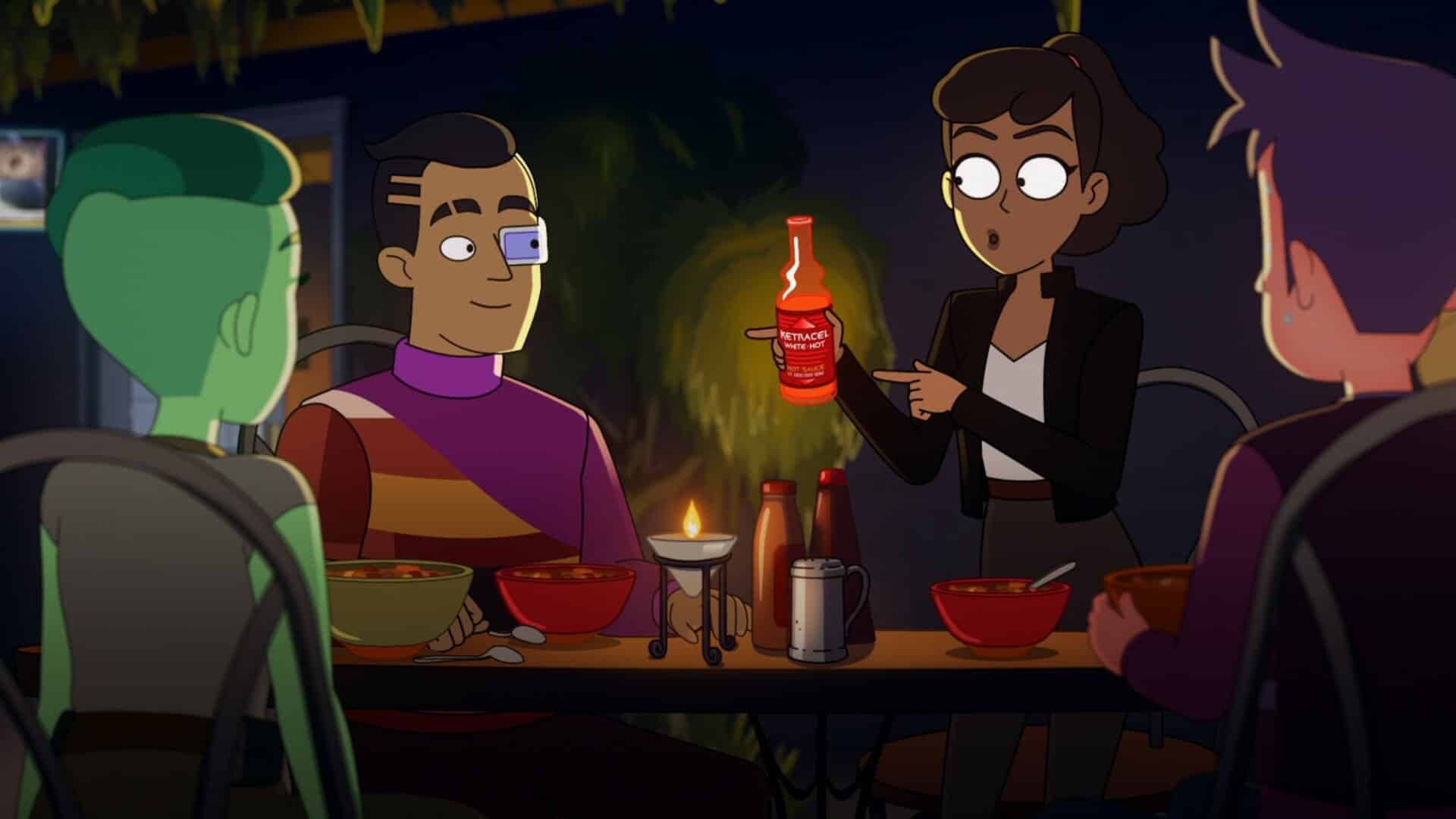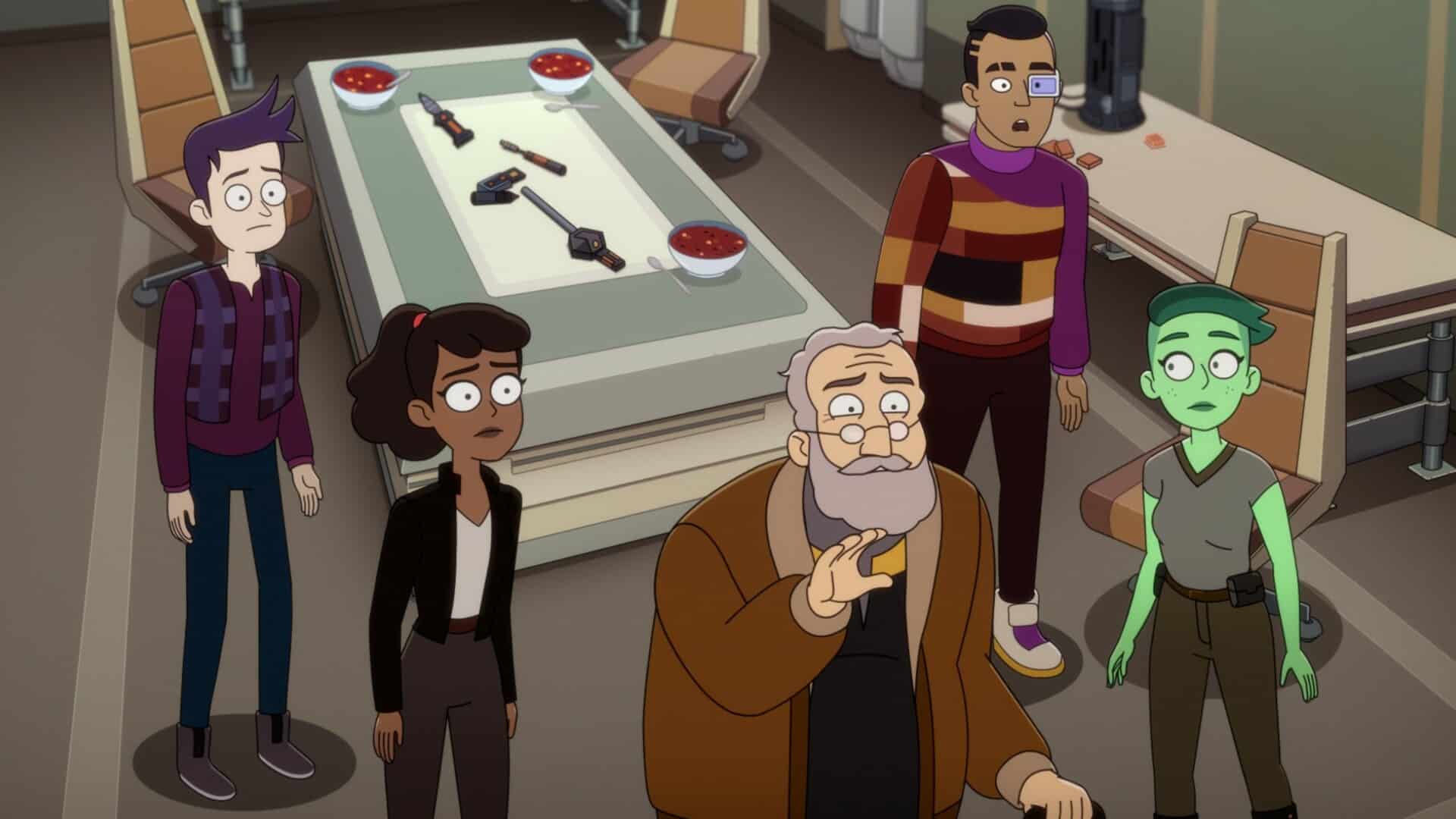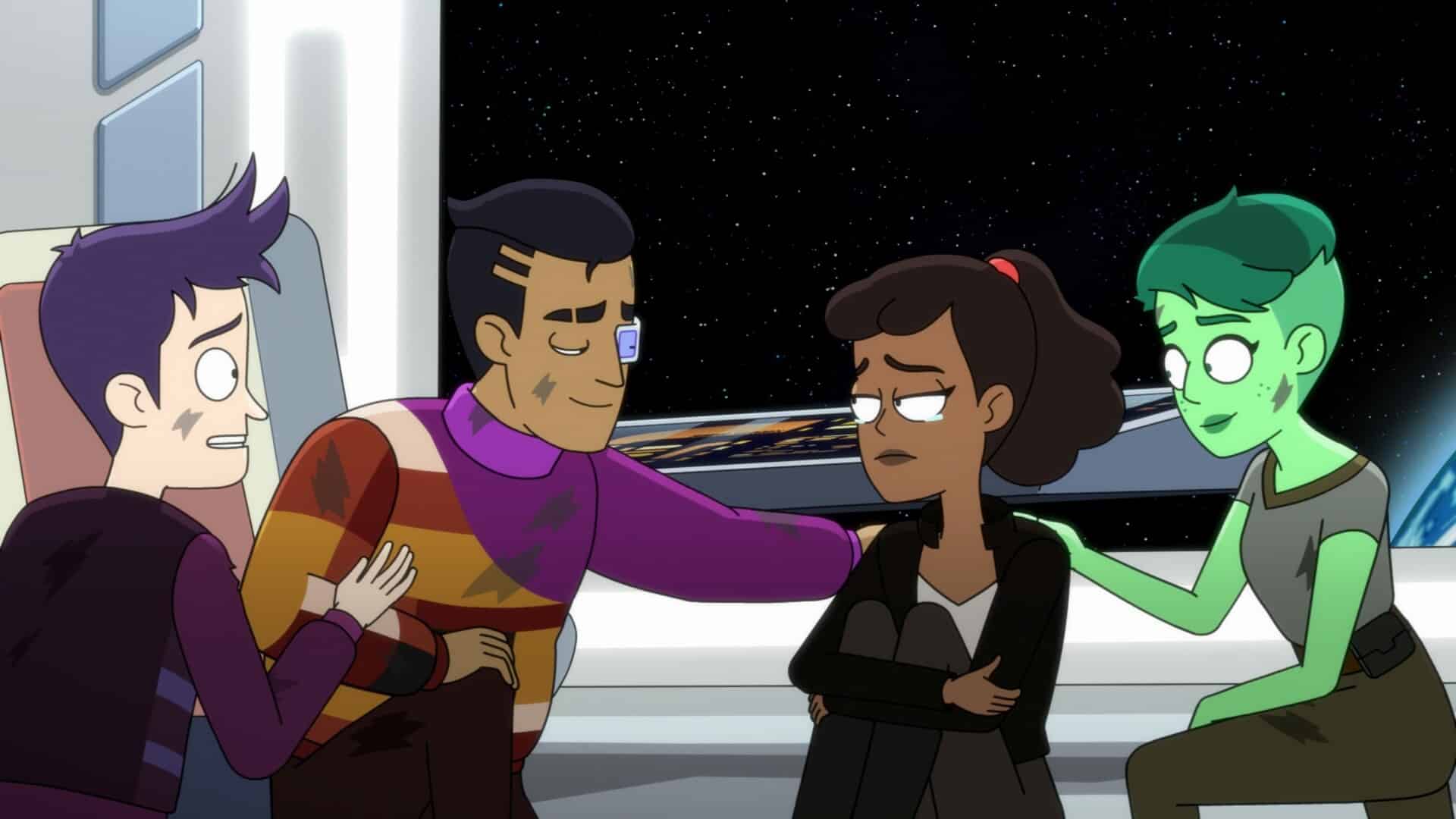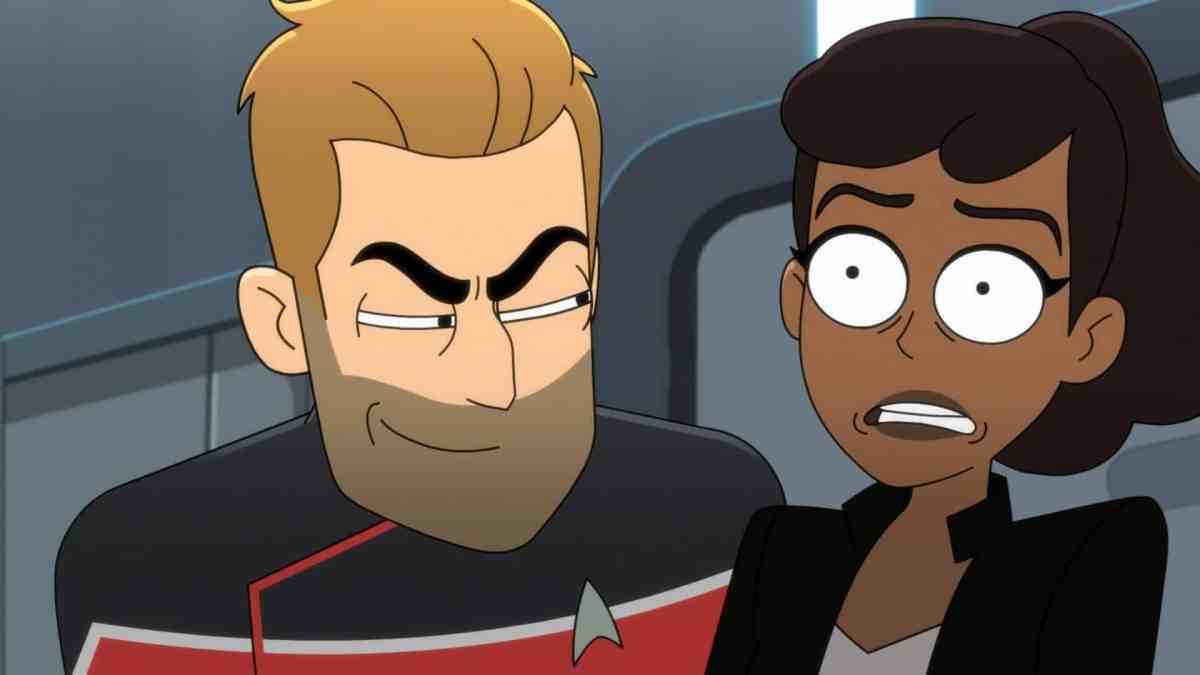This discussion and review contains spoilers for Star Trek: Lower Decks season 3, episode 1, “Grounded.”
“Grounded” demonstrates both the easy charm of Star Trek: Lower Decks and the limitations of the modern iteration of Star Trek.
As with most Lower Decks episodes, season 3 premiere “Grounded” is riffing on a particular kind of Star Trek story. It evokes classic Star Trek adventures like The Search for Spock or Insurrection, in which the primary cast is forced to go rogue for the greater good. It is a reliable narrative template and a suitably compelling premise for a season premiere. It is to the credit of Lower Decks that its season premieres generally feel more like Deep Space Nine than The Next Generation or Voyager.
Similar to in Deep Space Nine, with Kira (Nana Visitor) being reassigned to Bajor at the start of the second season, the Dominion taking control of the station at the start of the sixth season, or Sisko (Avery Brooks) returning to Earth at the start of the seventh season, “Grounded” hints at a radical change to the status quo. But as with Boimler’s (Jack Quaid) transfer to the Titan at the start of Lower Decks’ second season, it is disappointing that “Grounded” essentially ends with a complete reversion to the episodic status quo.
Of course, this misdirect is part of the larger joke. It’s a deliberate subversion of expectations. It’s also not entirely a bad thing, as it finally draws the curtain down on the show’s long-running Pakled subplot, which has never felt like it was going anywhere. More than that, given the ending of the first season of Strange New Worlds, it is tempting to wonder whether that show’s “primary cast member is arrested as season-ending cliffhanger” took the wind out of Lower Decks’ sails just a bit.
Still, it is a shame that Lower Decks is unwilling to commit to the medium-term arcs that Deep Space Nine embraced. It could have been fun to spend an episode or two with Mariner (Tawny Newsome) leading the cast on a set of rogue misadventures like in The Voyage Home, or the Sisko family subplot in “Shadows and Symbols.” There is almost certainly comedy to be mined from four junior officers hijacking a starship and getting in over their heads.

The ending of “Grounded” is the episode’s biggest problem. To be fair, it is a decent joke on its own terms. The premise of Lower Decks has always been that its protagonists exist at the margins of more typical Star Trek adventures, so it makes sense that they wouldn’t be the heroes to resolve the cliffhanger involving Captain Freeman (Dawnn Lewis) any more than they were crucial to the resurrection of Shaxs (Fred Tatasciore). In theory, this is all solid.
The problem is how “Grounded” chooses to resolve the conspiracy plot. The episode hinges on the idea that the Federation’s justice system actually works, which is pretty much counter to everything Star Trek has ever demonstrated. The franchise has long argued that the upper echelons of Starfleet Command and the Federation are at best incompetent and at worst actively corrupt. Even on The Next Generation, the crew of the Enterprise seemed an exception.
Starfleet bureaucracy has never been supportive of the franchise’s heroes. Senior members of Starfleet are complicit in the conspiracy to assassinate the Federation President (Kurtwood Smith) in The Undiscovered Country. Admiral Mark Jameson (Clayton Rohner) illegally supplied arms to both sides on Mordan IV in “Too Short a Season.” In “Ensign Ro,” Admiral Kennelly (Cliff Potts) was implicated in illegal arms trades with the Bajorans as part of a Cardassian manipulation.
On Deep Space Nine, Admiral Ross (Barry Jenner) might have been the franchise’s most upstanding embodiment of Starfleet senior management, but “Inter Arma Enim Silent Leges” made him party to the framing of Romulan Senator Cretak (Adrienne Barbeau). Starfleet endorsed Sisko’s plan to trick the Romulans into joining the Dominion War in “In the Pale Moonlight,” a scheme that led to the murder of Senator Vreenak (Stephen McHattie).

Starfleet and Federation justice is also notoriously unreliable. In “The Drumhead,” Picard (Patrick Stewart) has to call out Admiral Satie (Jean Simmons) when she turns an inquiry into a witch hunt. In both “The Measure of a Man” and “Author, Author,” Starfleet tribunals refuse to recognize artificial intelligences as lifeforms, kicking that can down the road rather than making an actual decision. In “Court Martial,” Kirk (William Shatner) resorts to unconventional methods to prove his innocence.
Hell, the stories on which “Grounded” is explicitly riffing are built around the idea that our heroes cannot always trust Starfleet. In The Search for Spock, Kirk has to hijack a ship to save Spock (Leonard Nimoy) when Starfleet proves useless. In Insurrection, Picard can’t wait for Starfleet to realize the inhumanity of Admiral Dougherty’s (Anthony Zerbe) planned forced relocation of the Ba’ku. Even in First Contact, Picard violates Starfleet orders by taking the ship to confront the Borg.
As such, the emphasis that “Grounded” places on the “need to be patient and trust in the system” feels somewhat misguided in the larger context of the franchise. However, it is very much in line with how modern Star Trek uncritically approaches Starfleet and the Federation. Between them, Kirk, Picard, and Sisko have years of experience demonstrating the folly of trusting in the system, but modern Star Trek repeats “we are Starfleet” as a mantra. It’s a very shallow understanding of the Star Trek franchise.
The faith that “Grounded” places in Starfleet as an institution is frustratingly naïve. “Come on, they’re Starfleet,” Boimler tells Mariner. “If we can’t trust them to do the right thing, what can we trust in?” Tendi (Noël Wells) responds, “Yeah, Mariner. We have to believe.” This is very much in keeping with how recent Star Trek spin-offs like Discovery and Picard have come to treat Starfleet as an institution that exists beyond criticism or interrogation.

It is also oddly tone-deaf. In the United States, public faith in the Supreme Court is at an all-time low. The institution’s erosion of individual rights, and its transformation into an instrument of minority rule, has completely undermined public confidence in the Supreme Court. “Grounded” even acknowledges as much when Mariner voices her frustration at the “planets’ rights lunatic” that would try her mother’s case, evoking the importance of “states’ rights” in right-wing jurisprudence.
Of course, writing on the third season of Lower Decks was well underway by May 2021, so the basic plot of “Grounded” predates the most recent and most extreme examples of this trend. However, it still followed the controversial appointments of Brett Kavanaugh and Amy Coney Barrett, as well as the Trump administration’s well-documented appointment of unqualified judges to the federal bench. It definitely feels like the production team working on “Grounded” failed to read the room.
Even outside of the charged modern context of asking the audience to trust a “conservative military court,” the episode presents Freeman’s trial as a media circus. The obvious frame of reference in terms of Lower Decks as a show rooted in 1990s Star Trek is something like the OJ Simpson trial. Ransom (Jerry O’Connell) and T’Ana (Gillian Vigman) wear sunglasses as they face down the press like a celebrity. It is covered on FNN, suggesting CNN’s sensationalist coverage of the Simpson trial.
With the benefit of hindsight, the OJ Simpson trial is widely regarded as a miscarriage of justice. As such, there is something decidedly trite in Admiral Freeman’s (Phil LaMarr) repeated assertion that his daughter should have “faith in Starfleet. The truth will come out.” Captain Freeman talks about how she was saved by “Starfleet’s best believing in one of their own,” obviously never having seen Picard interact with Admiral Nechayev (Natalia Nogulich).

Still, allowing for this central problem, “Grounded” demonstrates a lot of the easy charm of Lower Decks. After 10 weeks of watching Strange New Worlds play unconvincing Star Trek karaoke, there is something refreshingly candid in watching Lower Decks build a straight-up nostalgic theme park around First Contact for its 25th anniversary. It’s honest in what it is doing. It is also nice to see the statue that Geordi (LeVar Burton) described in the film and to “make a first contact — with fun!”
Similarly, the short aside with Transporter Chief Carlton “Denny” Dennis (Bobby Moynihan) is a delightful bit of fun. It’s a clever play on an iconic scene from The Search for Spock and another acknowledgement of the surprising power that transporter technicians hold in the Star Trek franchise. Like Gavin the Botanist (Moynihan) later in the episode, Denny is a winsome one-shot character. His status as “a bit of a buffer buff” also allows the episode the opportunity for some charming Easter eggs.
There’s also something undeniably appealing in the plot point that hinges on the “big swarm o’ glowin’ space critters” that choose the Cerritos as the site of their “mass reproductive event,” which Mariner more bluntly describes as “an orgy.” Tendi helpfully states, “I guess they were searching for a breeding ground, and we’re it.” It feels like an homage to episodes like “Galaxy’s Child” or “Elogium,” just bringing the weird subtext of those sorts of stories to the fore.
Prompted by statements made by William Shatner at Comic-Con, there has been some debate about the extent to which modern Star Trek respects the vision and legacy of Gene Roddenberry. The decision to make the Cerritos the location of a weird alien orgy feels oddly true to Roddenberry’s creative vision both inside and outside the franchise. Ira Steven Behr has talked about how the pleasure planet of Risa originated as a vehicle for Roddenberry’s “sexual fetishes.”
It’s also nice to spend time with the Lower Decks ensemble again. As the series lead, Mariner is the episode’s driving force, and “Grounded” anchors itself in her genuine love for and concern about her mother. At the climax of the episode, Mariner acknowledges that her recklessness is driven by her fear of losing her mother. “They could take her away forever and I… I can’t stop it,” she confesses. As with her similar arc in “Crisis Point,” it’s a moment of actual and meaningful character work.
“Grounded” is an episode that works better in its smaller moments than in the bigger picture, showcasing both the strengths of Lower Decks and the blind spots of modern Star Trek.






Published: Aug 25, 2022 11:40 am